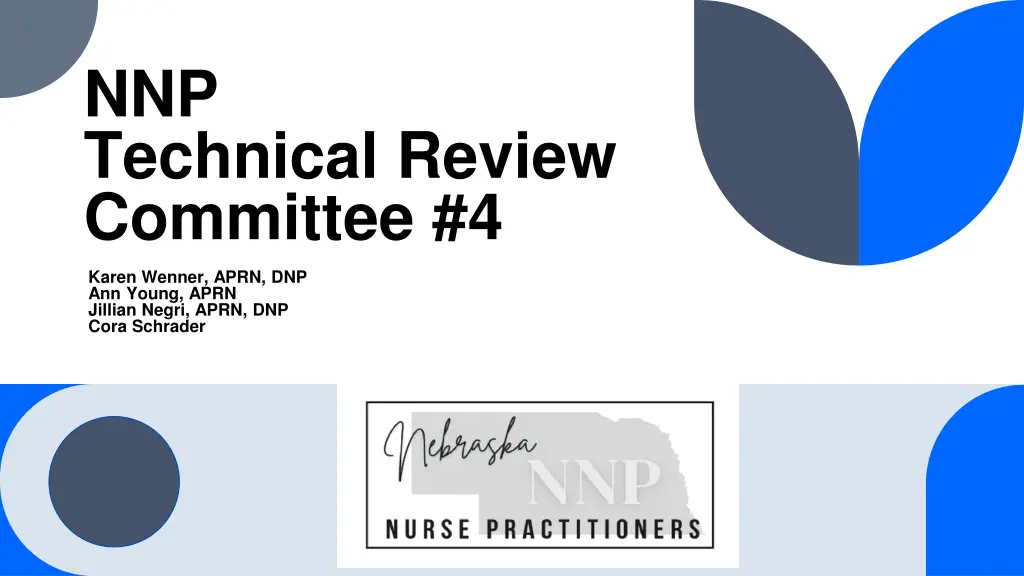
Evaluation of Proposed Scope of Practice Changes for Nurse Practitioners in Nebraska
"Reviewing the impact of expanding Nurse Practitioners' scope of practice, focusing on public health, safety, and welfare considerations. Exploring the benefits, risks, and training requirements associated with the proposed changes to enhance access to care in Nebraska."
Download Presentation

Please find below an Image/Link to download the presentation.
The content on the website is provided AS IS for your information and personal use only. It may not be sold, licensed, or shared on other websites without obtaining consent from the author. If you encounter any issues during the download, it is possible that the publisher has removed the file from their server.
You are allowed to download the files provided on this website for personal or commercial use, subject to the condition that they are used lawfully. All files are the property of their respective owners.
The content on the website is provided AS IS for your information and personal use only. It may not be sold, licensed, or shared on other websites without obtaining consent from the author.
E N D
Presentation Transcript
NNP Technical Review Committee #4 Karen Wenner, APRN, DNP Ann Young, APRN Jillian Negri, APRN, DNP Cora Schrader
Credentialing Review 407 Evaluation of Proposals for Change in Scope of Practice
Criterion 1 The health, safety, and welfare of the public are inadequately addressed by the present scope of practice or limitations on the scope of practice. Nebraska's current scope of practice negatively impacts public health, safety, and welfare by reducing access to care, especially in rural areas. NPs cannot provide the same care as their colleagues, physician assistants, despite being hired in the same role such as a provider in a critical access emergency department. NPs face barriers to employment in specialized roles, and specialists are unable to hire NPs where needed. This contributes to provider shortages, delays in procedures, unnecessary workarounds and forces patients to travel or be transferred for specialized care.
Criterion 2 Enactment of the proposed change in scope of practice would benefit the health, safety or welfare of the public. Allowing Nurse Practitioners (NPs) to perform fluoroscopy will enhance access to care, particularly in rural and underserved areas. The expanding role will address workforce shortages, growing healthcare demands, and improve recruitment of specialists to Nebraska. Enactment will improve healthcare efficiency by reducing wait times, reducing patient transfers and easing the workload of physicians, surgeons and radiologists.
Criterion 3 The proposed change in scope of practice does not create a significant new danger to the health, safety or welfare of the public. While small, there is an increased risk of harm from higher exposure and dosages of radiation. Prolonged fluoroscopy can cause tissue burns, hair loss and add to cumulative risk of cancer. This is an extremely rare occurrence due to the advancements in technology, smaller radiation dosages and radiation safety mechanisms in place. The mini C-arm has such low dosages, the patient, operator and surrounding staff no longer require shielding/protection. The reports of harm from fluoroscopy in the last 10 years have occurred during lifesaving procedures in interventional radiology where the chance of survival outweighs the harm from radiation. The risk of harm from fluoroscopy by nurse practitioners can be safely mitigated through education and training. This is evident by the low instance of harm from fluoroscopy in this state and 22 others. Nurse practitioners routinely order radiation burdening diagnostics and are aware of the potential harm/risks to patients. With additional education and training, in fluoroscopy, the risk of harm is minimized.
Criterion 4 The current education and training for the health profession adequately prepares practitioners to perform the new skill or service. NPs are educated and trained in radiation safety. NPs order x-ray, CT scans, nuclear medicine studies, interventional radiology procedures and all other facets of radiation exposing diagnostics, many of which have higher levels or radiation exposure to the patient. NNP proposes a minimum of 4 hours of post graduate didactic education in fluoroscopy which includes: radiation safety, radiation production and characteristics, radiobiology, contrast media, and fluoroscopic unit operation.
Criterion 5 There are appropriate post-professional programs and competence assessment measures available to assure that the practitioner is competent to perform the new skill or service in a safe manner. An Approved Education Program means the University of Nebraska Medical Center s Fluoroscopy Radiation Safety Training for UNMC/The Nebraska Medical Center or equivalent course as approved jointly by the Department and the Board of Nursing NNP proposes clinical training of a minimum of five fluoroscopic procedures under the supervision of a formally trained preceptor to ensure competency.
Criterion 6 There are adequate measures to assess whether practitioners are competently performing the new skill or service and to take appropriate action if they are not performing competently. Employers/healthcare facilities have guidelines and processes for evaluation of the nurse practitioner. Competency is evaluated for hospital/facility privileges and at each renewal cycle which is typically every 2 years. Facilities where fluoroscopy is performed must abide by the Radiation Control Act which has several mechanisms for monitoring competency and patient safety. Collaboration with physicians and other healthcare providers/specialists is a requirement of professionalism and provision of safe patient care. In specialty areas where fluoroscopy is typically utilized there is physician/surgeon supervision, collaboration and oversight. If there is a question of competency, several reporting mechanisms exist through employers, Nebraska Board of Nursing, DHHS, and Office of Radiological Health.
Thank you Questions?
